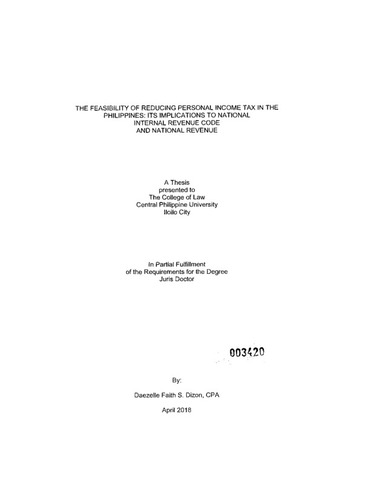Показать сокращенную информацию
The feasibility of reducing personal income tax in the Philippines: Its implications to National Internal Revenue Code and National Revenue
| dc.contributor.adviser | Alibogha, Salex E. | |
| dc.contributor.author | Dizon, Daezelle Faith S. | |
| dc.coverage.spatial | Philippines | en_US |
| dc.date.accessioned | 2021-06-29T05:53:06Z | |
| dc.date.available | 2021-06-29T05:53:06Z | |
| dc.date.issued | 2018 | |
| dc.identifier.citation | Dizon, D. F. S. (2018). The feasibility of reducing personal income tax in the Philippines: Its implications to National Internal Revenue Code and National Revenue (Unpublished postgraduate thesis). Central Philippine University, Jaro, Iloilo City. | en_US |
| dc.identifier.uri | https://hdl.handle.net/20.500.12852/1115 | |
| dc.description | Abstract only | en_US |
| dc.description.abstract | This study was conducted to determine the feasibility of reducing personal income tax in the Philippines. Qualitative Study approach particularly Economic Feasibility was used in the study. The power of taxation proceeds upon the theory that the existence of government is a necessity; that it cannot continue without means to pay its expenses; and that for these means it has a right to compel all its citizens and property within its limits to contribute. The principle is applied in the study to help us determine the government strategies to fill in the gap in reducing the personal income tax. Different statistical researches from Department of Finance, Bureau of internal Revenue and other Research Institutions were used to compare the effect of reducing the personal income tax to the National Internal Revenue Code and National Revenue. Through the course of the study it was determined that reducing personal income tax will ease the tax burden on the middle class and provide significant after-tax cash for most individuals that may be available and allocate this for investment which will create opportunities for wealth planning. Recommendations are focused in providing a framework less complex, more attractive, and more productive, portrayed by low rates and an expansive base that advances venture, work creation and poverty reduction. This will likewise be supplemented by significant duty organization changes in both the Bureau of Internal Revenue (BIR) and Bureau of Customs (BOC). | en_US |
| dc.format.extent | ix, 55 leaves | en_US |
| dc.language.iso | en | en_US |
| dc.rights | Attribution-NonCommercial-NoDerivs 3.0 Philippines | * |
| dc.rights.uri | http://creativecommons.org/licenses/by-nc-nd/3.0/ph/ | * |
| dc.subject.ddc | Law Library 340.72 D648 2018 | en_US |
| dc.subject.lcsh | Income tax | en_US |
| dc.subject.lcsh | Income tax--Law and legislation | en_US |
| dc.subject.lcsh | Taxation | en_US |
| dc.subject.lcsh | Taxation--Law and legislation | en_US |
| dc.subject.lcsh | Revenue | en_US |
| dc.subject.lcsh | Internal revenue | en_US |
| dc.subject.lcsh | Internal revenue law | en_US |
| dc.subject.lcsh | Philippines | en_US |
| dc.subject.lcsh | Revenue--Law and legislation | en_US |
| dc.title | The feasibility of reducing personal income tax in the Philippines: Its implications to National Internal Revenue Code and National Revenue | en_US |
| dc.type | Thesis | en_US |
| dc.description.bibliographicalreferences | Includes bibliographical references | en_US |
| dc.contributor.chair | Bedona, Zacarias D. Jr. | |
| dc.contributor.department | College of Law | en_US |
| dc.description.degree | Juris Doctor | en_US |
| local.subject | National Internal Revenue Code of 1997 | en_US |
| local.subject | Tax Code | en_US |
| local.subject | RA 8424 | en_US |
| local.subject | Tax reduction | en_US |
Файлы в этом документе
Данный элемент включен в следующие коллекции
-
Juris Doctor [144]



